
There is one ingredient that makes my food storage BETTER than my mother’s food storage… cheese! Money was tight growing up because my father worked seasonal jobs. This meant during the off-season, our meals mostly came from our food storage. We ate a lot of stew during those times. My mother did her best but only knew so many ways to cook beans, rice, flour, and (canned & garden) veggies. I’m ashamed to say that my sisters, brothers, and I complained insufferably about each and every meal. As I got older, I understood how vital food storage was to my family, and I continued the tradition of food storage when I got married. As I’ve embraced the preparedness community, I learned of one secret ingredient I wish my parents had in their food storage. It turns bland food storage staples into delicious meals (7 examples found below). I call it a secret ingredient because many people are not aware it is food storage-friendly. In fact, I know many people with food storage, but very few that stock up on cheese.
Immortal Cheese
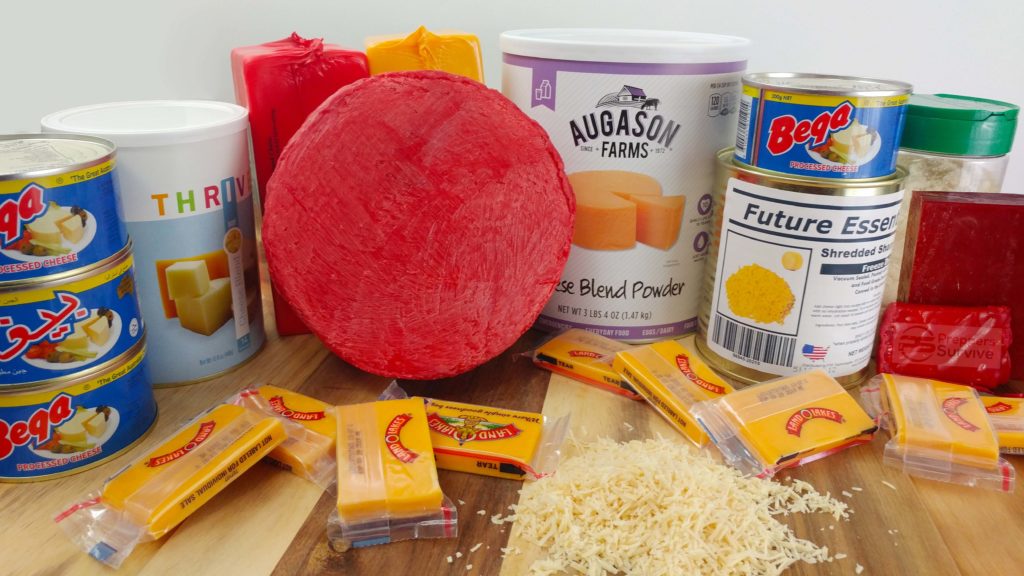
According to Clifton Fadiman (1940-1999), ‘Cheese is milk’s leap toward immortality’.
Cheese dominates the food industry and sells on a massive scale. Its popularity comes from its great taste, health benefits, and convenience. For these reasons, you’ll find cheese in almost every home in the nation, no matter if you are rich or poor. As Americans, we love our cheese, but we know very little about it. For example, most people don’t know that cheese ‘stored properly’ can last for decades, which makes it a great food storage item. Cheese has been around for over 4000 years, way before icebox refrigerators were invented.
How Long Will Cheddar Cheese Last?
Not all cheese is immortal, so what’s the key to a long shelf life? There are three types of cheeses: soft, semi-soft, and hard. Soft cheeses have too much moisture, making them unsuitable for long-term food storage. Hard cheese goes through an extensive moisture extraction process, so it’s harder than soft cheese. The lack of moisture allows hard cheese to last longer than other dairy products. When cheese is freeze-dried or dehydrated, the moisture is removed, which is the secret to its long shelf life.
Examples of Hard Cheese
cheddar
parmesan
gouda
romano
How long can you store cheese? Mainstream society would have you believe that sealed cheese will last several months in the fridge. However, some manufacturers sell cheddar cheese that has aged 15 – 40 years. It’s still edible, but over time it will lose some of its health benefits as enzymes eat away at the protein. This process sharpens the taste of the cheese. Hard cheese can outlast your canned food as long as you don’t mind the taste of sharp cheddar. It’s amazing to me that there is cheese out there that is older than I am, and that I could use old cheese as cultures to make new cheese. This process can be done over and over again, turning it into immortal cheese.
Technology has made adding cheese to food storage EASY! For example, I have a combination of dehydrated cheese powder, shredded freeze-dried cheese, and canned cheese spread in my food storage. The ‘dry’ cheese has expiration dates of 15 – 25 years. However, I don’t know many preppers that put much stock in expiration dates. This is another reason they are known as immortal cheese.
7 Foods That Cheese Transforms

My siblings and I really enjoyed Mac & Cheese when we were younger. We didn’t get it often because it had to be purchased at the store and was not available in bulk. I have grown out of my Mac & Cheese phase but will always remember that cheese is one of the best and simplest ways to dress up noodles. Here is a list of basic food storage items or recipes that cheese can transform. If the word is highlighted, it’s a link to a recipe.
1. Potatoes – AuGratin Mashed Potatoes
2. Eggs – Omelet
3. Homemade Tortillas – Quesadilla
4. Homemade Tortilla Chips – Nachos
5. Chicken – Cordon Bleu
6. Noodles – Mac & Cheese
7. Homemade Bread – Cheese Sandwich or Grilled Cheese
Tip – By adding white cooking wine & cheese to my food storage, I can make fondue in times of scarcity. Fondue is a cheese sauce that is great for dipping meat, veggies, bread, and just about anything else. It’s a great way to create a fun, simple, delicious meal. Cheese also allows me to turn random ingredients into casseroles.
Signs That You Don’t Have Immortal Cheese
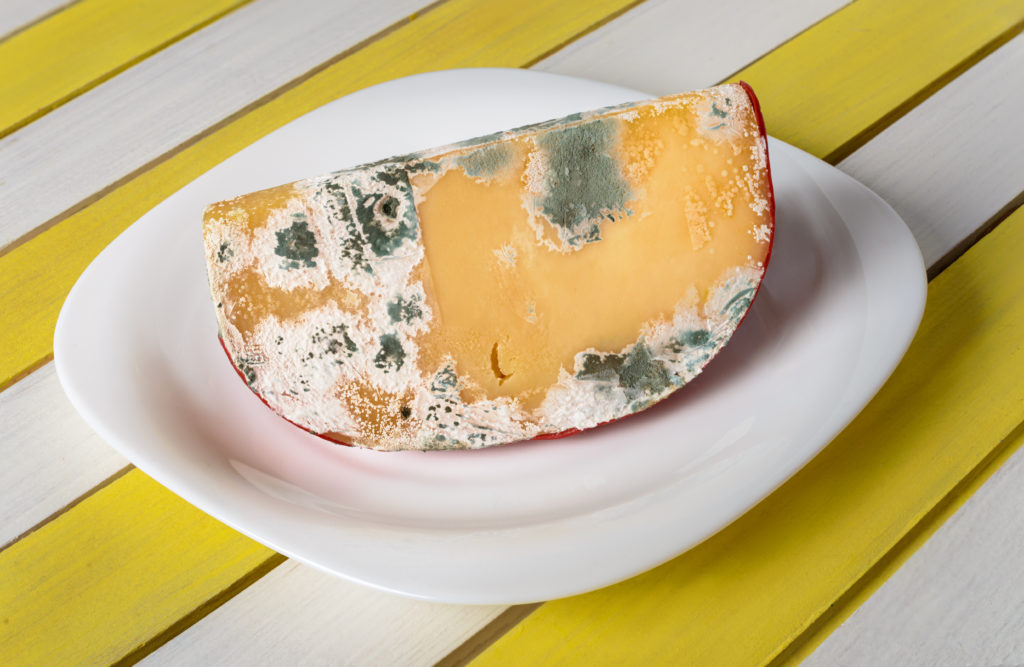
Past experience with spoiled dairy products made me skeptical, at first. But I’ve developed the TA-TA formula to help. It’s fairly simple to recognize spoiled food using your senses. To help me evaluate if aged cheese that has been sealed in wax and stored in the pantry is safe to eat I’ll pay close attention to texture, appearance, taste, and aroma.
Texture – It should be dry, smooth, and hard with a slight cushion feel when squeezed.
Appearance – Mold can generally be cut-off hard cheese or wiped off with vinegar and still be safe as long as there are no other signs of spoilage. Be careful of black mold or if the mold is more than surface deep, these can be signs of harmful bacteria that can cause food poisoning.
Taste – It’s NOT recommended to taste a cheese that is suspected of going bad. When in doubt, throw it out! But just like sour cream, sometimes you can’t always see or smell that it’s spoiled. Only stock up on cheeses that you’re familiar with. That way, you can tell if the taste is off.
Aroma – Chedder had a distinct smell. To me, it smells good and makes my mouth water with anticipation; if it has a repugnant odor, that’s a definite warning sign to avoid eating.
The Process of Waxing Cheese
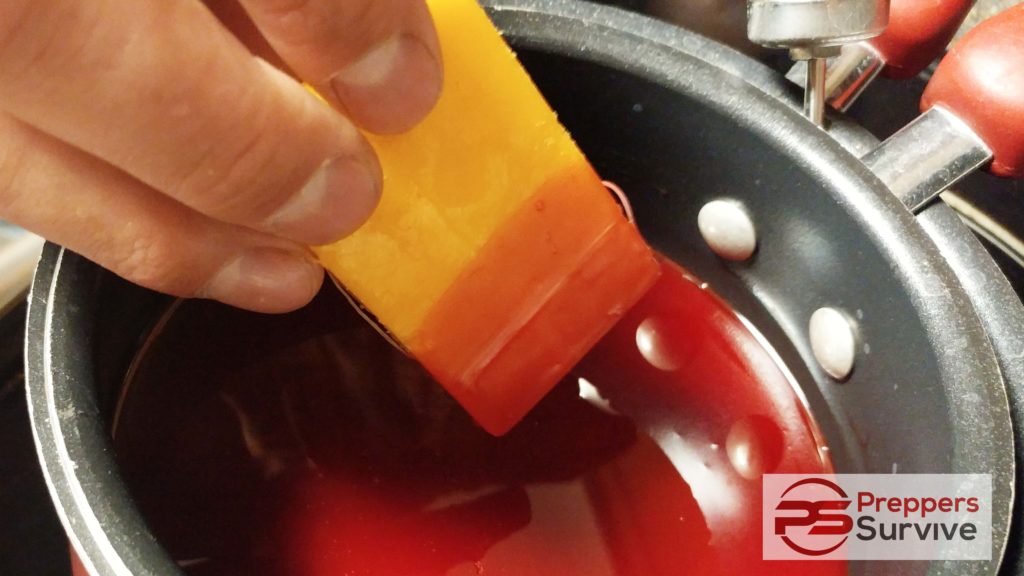
Cheese waxing is gaining immense popularity these days. It keeps the taste and content intact and allows you to relish the delicious taste of it whenever you want. All you need is to practice it a few times.
Here are a few steps to preserve cheese using wax.
Infographic Source: CheeseMaking.com
– – – – – – – – – – – – –
Thank you for visiting Preppers Survive. If you enjoyed this post please comment below, subscribe, or share it on your favorite social media site.
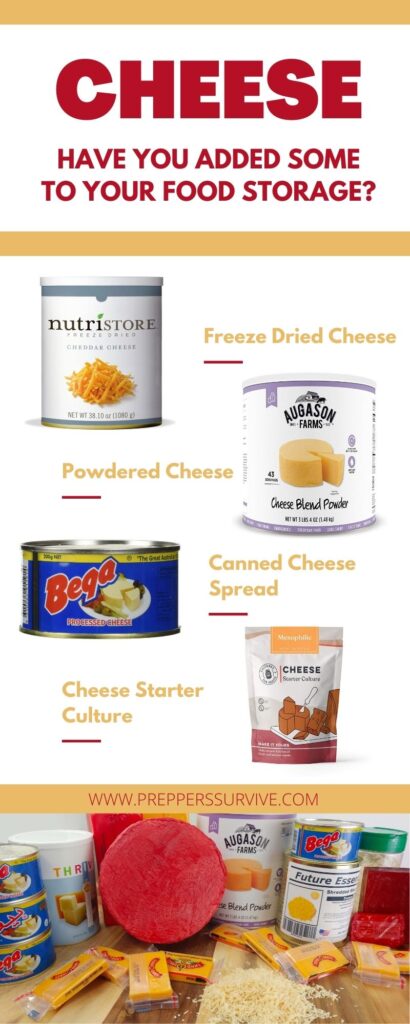




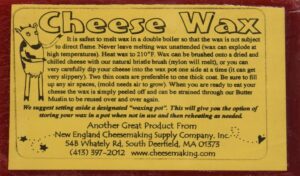

Nettie, thank you so much! We are pretty new to the Prepping Lifestyle, I only JUST recently started purchasing our food stock and Cheese was on my list! I purchased the dry powder but haven’t has a chance to try it yet. Thanks you so much for sharing your knowledge, this has brought a sense of security to our family.
Great information Thanks;
Where do you find “dehydrated cheese powder, shredded freeze-dried cheese, and canned cheese spread”? Links? Brand name suggestions?
If you tie your cheese up with cotton string you can more safely dip it in the wax. Plus, if you hold the cheese with your hand to dip, you could share bacteria with your cheese.
I’m tickled to have found your site! Question: I have purchased several blocks of cheddar cheese from the local grocery store. Can I dip the blocks to keep them for longer term storage? When I bought them, my son was home….